"We are ruthless and ask no quarter from you. When our turn comes we shall not disguise our terrorism." - Karl Marx, Marx-Engels Gesamt-Ausgabe, vol. vi pp 503-5 (The final issue of Neue Rheinische Zeitung, 18 May 1849)
“In politics you cannot follow nonviolence. You cannot follow
honesty. Every moment you have to give a lie. Every moment you have
to take a bullet in hand and kill someone.” -
Gopal Godse, co-conspirator in Gandhi's assassination, Time Magazine, February 2000.
"Terrorism and deception are weapons not of the strong but of the weak." - Mohandas K. Gandhi
 |
| Body of Indian leader Mahatma Gandhi lies in state at Birla House in New Delhi. |
Although Gandhi regarded the union and independence of the Indian peoples as his goal, his reactionary-Utopian social theory and the reformist methods of struggle connected with it caused his activity to fail in facilitating overthrow of the colonial yoke [...] The social essence of the Gandhi doctrine and its fundamentally reactionary role in the history of India's national liberation movement has hardly been treated in Marxist literature. Yet this doctrine still retards the development of class awareness among the Indian masses.What was this social essence of Gandhian thought that so troubled the Marxist Leninists in the Soviet Union? First, the reformist methods of struggle referred to in the above quote was nonviolent resistance and secondly his social theory rejected class struggle as another manifestation of destructive violence. On September 11, 1906 a new word came into existence that would give a better understanding of Gandhi's social theory and method of struggle which he described as:
'Satyagraha.' Truth (Satya) implies love, and firmness (agraha) engenders and therefore serves as a synonym for force. I thus began to call the Indian movement 'Satyagraha,' that is to say, the Force which is born of Truth and Love or non-violence, and gave up the use of the phrase 'passive resistance,' in connection with it, so much so that even in English writing we often avoided it and used instead the word 'Satyagraha' itself or some other equivalent English phrase.The Marxist-Leninists embraced revolutionary violence and a movement led by a small vanguard of intellectuals and professional revolutionaries that would carry out the changes necessary by whatever means necessary and rejected nonviolence as naive. They followed the doctrine of Lenin as presented in his 1902 revolutionary tract What is to be done.
Over a century has passed since both sets of ideas have been set out and applied around the world. An analysis done by Maria J. Stephen and Erica Chenoweth systematically explores the strategic effectiveness of both violent and nonviolent campaigns using data on 323 campaigns carried out between 1900 and 2006.[1] There findings demonstrate that major non-violent campaigns were successful 53% of the time versus only 26% for major violent campaigns and terrorist campaigns had a dismal 7% success rate.
'Bapu' as Mahatma Gandhi was fondly called, showed the affection that people of India had for him.
— Congress, Minority Department (@INCMinority) January 30, 2021
Gandhi Ji's values of non-violence, equality and brotherhood showed a path not only to India, but to the world. On the martyrdom day of Gandhi Ji, we remember him in our thoughts. pic.twitter.com/ztDWJAzz8T
"The socialists and communists say, they can do nothing to bring about economic equality today. They will just carry on propaganda in its favor and to that end they believe in generating and accentuating hatred. They say, when they get control over the State, they will enforce equality. Under my plan the State will be there to carry out the will of the people, not to dictate to them or force them to do its will." - Mohandas GandhiIt is Satyagraha that is relevant today in 2021 and offers an alternative to the conflagrations suffered in the 20th century and the wars that plague the world now. Gandhi's Satyagraha is a call to principled non-violence but even pragmatists and realists looking over the historical record cannot fail to be influenced by the fact that non-violent civic resistance works and in the aggregate offers a better chance of a better life for more people.
"It is my firm conviction that if the State suppressed capitalism by violence, it will be caught in the coils of violence itself, and will fail to develop non-violence at any time. The State represents violence in a concentrated and organized form. The individual has a soul, but as the State is a soulless machine, it can never be weaned from violence to which it owes its very existence." - Mohandas Gandhi
Below is a German documentary about the assassination of Mohandas Gandhi.
[1]Stephan, Maria J. and Chenoweth, Erica Why Civil Resistance Works: The Strategic Logic of Nonviolent Conflict. International Security, Vol. 33, No.1 (Summer 2008), pp. 7-44
[2] Gandhi, Mohandas (author) Dalton, Dennis (editor) Mahatma Gandhi: Selected Political Writings September 1996 Hackett Publishing Company


















